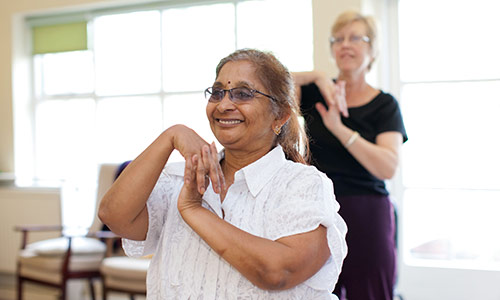Look after your thinking skills
 We all want to stay healthy and active in later life, so we’re interested in keeping fit mentally as well as physically. Increasingly, we’re learning what we can do to keep our thinking skills sharp as we age.
We all want to stay healthy and active in later life, so we’re interested in keeping fit mentally as well as physically. Increasingly, we’re learning what we can do to keep our thinking skills sharp as we age.
When it comes to keeping our minds sharp, some of the advice can be confusing or contradictory. From fish oils to physical activity, from B vitamins to brain training, open the newspaper and it’s easy to find claims on what helps and what harms.
But which claims can we trust? What do we reliably know about what will help us stay sharp as we age?
What does the science say about protecting your thinking skills?
- We know that our thinking skills change very gradually throughout our lives. Most of us lose a little of some of them and this doesn’t usually affect independence or quality of life. But differences between us mean that some people’s thinking skills improve over their lives, and some experience greater degrees of decline.
- Research is looking at a wide range of factors that might be involved in healthy ageing of our thinking skills, or that increase the risk of more serious decline.
- Many of these studies are on factors that we can influence ourselves. Evidence suggests, for example, that taking exercise and engaging in new activities are linked with better thinking skills in later life.
- Some lifestyle choices increase the risk of more decline. This includes smoking. In addition, some health conditions are now known to be associated with more decline, including cardiovascular disease and type 2 diabetes.

The basic message from research is that we have much more control over our destiny than we previously thought. How our thinking skills change over our life course is not set in stone - not everything is in our DNA.
What impact is your lifestyle having?
Open up the headings below to find out how the way you live your life could affect your thinking skills, according to the latest evidence.
To move or not to move?
A physically active lifestyle can help your mind stay fit.
Studies have repeatedly shown that people who lead a physically active lifestyle throughout their lives have a lower-than-average risk of decline in thinking skills with ageing.
Brain training - does it work?
For now, the evidence for specific 'brain training' programmes remains inconclusive.
We can't say for certain which activities might definitely help keep your thinking skills sharp, but doing hobbies and activities that we enjoy is important for quality of life and wellbeing anyway.
You are what you eat
Evidence is now accumulating that supports a link between diet and brain processes such as our thinking, or cognitive, skills.
Nutrients such as omega-3 fatty acids, vitamin D, and flavonoids are linked to maintenance of thinking skills in older age.
The science of sleep
Sleep is important to brain health.
We recommend making it a priority to get a good night’s sleep in order to maintain cognitive and brain health in later life.
Where there's smoke
Smoking accelerates ageing of the brain.
If you smoke, quit. Partial reversal of the damage to the brain caused by smoking can occur after quitting but it’s a long process, so don’t delay quitting.
The heart of the matter
Brain health and heart health are linked.
High blood pressure, high cholesterol, a high weight for height and diabetes are factors associated with increased risk of accelerated decline in thinking skills in later life. These are often termed 'risk factors'.
Alcohol and caffeine
We sometimes hear that we should be drinking red wine or coffee to protect our thinking skills in later life. But should we?
The evidence on whether alcohol and caffeine have protective effects for our thinking skills as we age is somewhat speculative at the moment.
Taking medicines
Some memory and thinking problems may be caused by certain medications, particularly a group of drugs known as 'anticholinergics'.
It's important to weigh up their benefits and be aware of the risks. If you have any concerns, talk to your doctor and discuss possible alternatives.
Your personality
Personality may change somewhat over time, but not greatly. These changes do not seem to be systematically related to thinking skills.
Whatever other changes people experience as they age, our personality stays fairly much the same.
Mental wellbeing
Mental wellbeing – feeling good, functioning well and coping adequately with life circumstances and challenges – is related to our brain health as we age.
The science behind how mental well-being is connected with brain health is not well-developed. However, a number of studies of older people have linked greater mental well-being to better cognitive health, and even reduced risks of dementia later in life.
Speaking more than one language
Speaking more than one language helps keep our thinking skills healthy in later life.
If you're considering learning a new language: it's never too late! If anything, the cognitive effects of language learning seem to increase with age.
Your social life
Stay connected with friends and family as this may help maintain thinking skills as we age.
Research suggests that having close ties to friends and family, and participating in meaningful social activities, may help people maintain their thinking skills better in later life and slow down cognitive decline.
Take your vitamins?
It's difficult to make recommendations about nutritional supplements – sometimes known as dietary supplements.
Stick to a good diet, with 5-a-day of fruit (especially berries) and veg; eat fish.
Small vessel disease
Small vessel disease, where the blood vessels in the brain that deliver oxygen and glucose and remove waste become damaged, is associated with loss of thinking skills, stroke and dementia.
The brain and body are very closely connected, so improvements in your general health are likely to improve your brain health.
Why small changes can make a big difference
 The evidence indicates that we can help ourselves to stay sharp as we grow older. It also tells us to take a range of steps because no one single factor is a ‘magic bullet’.
The evidence indicates that we can help ourselves to stay sharp as we grow older. It also tells us to take a range of steps because no one single factor is a ‘magic bullet’.
Rather, each of the factors associated with healthy cognitive ageing has an effect and these effects are thought to add up to help protect our thinking skills as we age. And we need to avoid the harmful factors.
Overall, evidence so far bears out the saying ‘healthy body, healthy mind’.
The things we would do to keep our body fit and healthy are also associated with staying mentally sharp in later life.
Your action plan: what can you do to stay sharp?
Based on the evidence so far, here are practical things that we can do to help stay sharp in later life.
1. Keep active
Get moving throughout the day and do physical exercises and activities that you enjoy – or try new ones. An active lifestyle and regular exercise are linked to healthier brains and sharper thinking skills in later life.
2. Don’t smoke
If you smoke, it’s best to stop. Smoking is linked with having a thinner cortex, the brain’s outer layer that is crucial for thinking skills. When you stop smoking, some reversal of this damage may be possible, but this can be very slow so it’s better to stop sooner rather than later.
About the NHS Stop Smoking service
3. Have regular check-ups
Have check-ups with your doctor to see if you have high blood pressure, high cholesterol or diabetes. These conditions are associated with higher risk of decline in thinking skills, particularly from middle-age.
4. Eat a healthy diet
Eat a diet high in fruit, vegetables, nuts, olive oil, beans and cereals; moderate in fish, dairy products and wine; and limited in red meat and poultry. This Mediterranean-style diet is linked to better brain health.
Advice on maintaining a healthy weight
5. Maintain a healthy weight
Manage your weight through healthy eating and physical activity. Being overweight may be a risk factor for accelerated decline in thinking skills. A healthy weight is better for physical health too.
Use the NHS Choices BMI calculator to check if your weight is within a healthy range
6. Take up a new activity
Take up activities or hobbies you haven’t done before. New activities might help improve thinking skills in later life as they challenge us in new ways. If you do activities in a group, the increased social interaction may play a role too.
7. Look after your sleep
Aim for an average of seven to eight hours sleep a day as this amount is related to better brain and physical health in older age. Try to get most of it at night, with only short daytime naps.
8. Learn another language
Learn and practise a language new to you. Learning and using more than one language is linked with better thinking skills in later life. And it’s never too late to start – if anything, the benefits of speaking multiple languages might increase with age.
With thanks for this page to scientists in the University of Edinburgh's Centre for Cognitive Ageing and Cognitive Epidemiology.
Photo credit: Douglas Robertson
